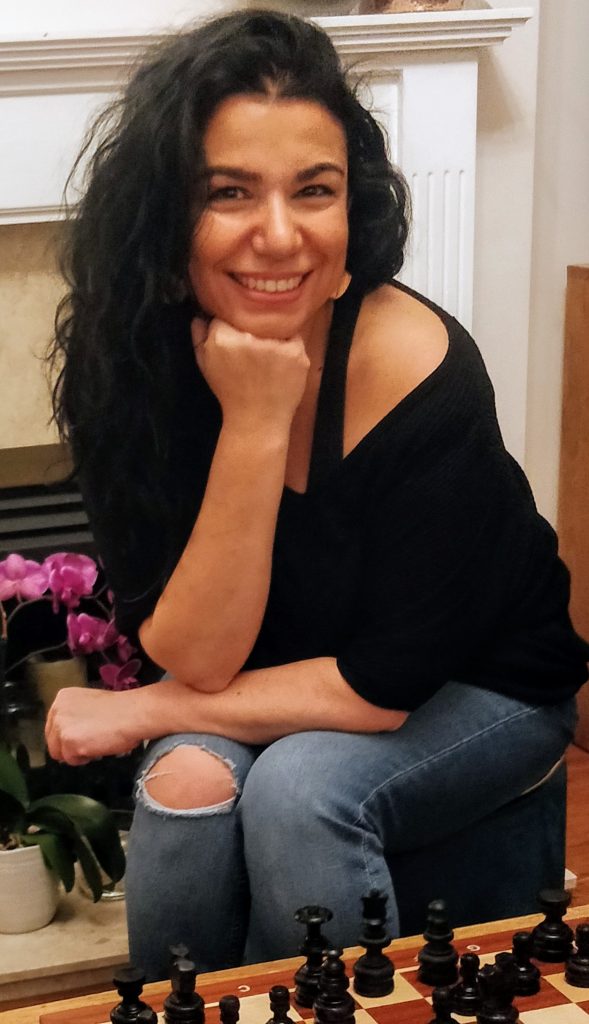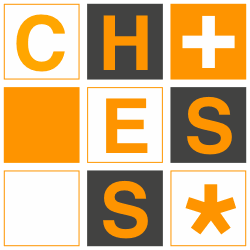The ECU Chess Teacher Training Course has been running since its inception in 2017. The course offers inspiration to anyone who wants to teach chess in schools. At our recent course we reached the landmark of one thousand graduates. The person who obtained Certificate no.1000 was Hari Neocleous. John Foley spoke to Hari to find out more about her and why she decided to attend the course.

How did you hear about the course?
I saw a notice on a Cypriot network that the European Chess Union was running a course for people from small nations and islands. I applied and I am glad I did. It was great.
What is your background?
I am a teacher at a state school in north London. I’ve been teaching in primary schools for 20 years. I am a specialist in teaching mathematics to Year 6 – the last year before they move up to secondary school.. I provide mathematics intervention for children who need special attention. They may have issues with attendance, behaviour or dyscalculia. I need to find solutions for each individual child.
How do children get individual attention?
We devote a lot of resources to ensure that children do not get left behind. The research shows that if children leave primary school lagging behind in their mathematics then they are at a disadvantage for several years. It is much easier to catch up at primary level that letting the issues slip until secondary school. In our primary school there are 30 teaching assistants working one-to-one with children with educational needs.
How do you help the children with their mathematics?
Some of these children have special educational needs. We use a variety of didactical techniques to develop their maths thinking. We have systems such as Numbers Count and mathematical manipulatives such as Numicon. We play maths games and we tell stories.
You also include the parents?
We also reach out to parents and run parent workshops. If the parents can be brought into the loop it is so much more beneficial for the children. Parents could for example help the children with their times tables. Parents could refer to numbers and calculations when talking to their children. Some parents lack confidence in numbers – perpetuating a negative view of mathematics through the generations. It must be admitted that some children in the past were badly taught and continue to pass on their fears to their children so it is taking decades to fix this.
What is the main difference between teaching mathematics then and now?
In the past children were taught “procedural learning” – they had to learn what was in the textbook. The emphasis was on a fixed body of knowledge and a fixed set of solution techniques. This meant that a lot of children who could not grasp a topic were excluded from making progress not only in maths but also in their general education. The current approach is all about “mastery”. Children are expected to have a fuller understanding of the topics they study. They approach the topics from different angles giving them a richer appreciation of the subject matter. From a practical point of view the class reaches the lower threshold of understanding and some pupils take the opportunity to explore further.
What is important in teaching mathematics?
There is the national curriculum and in addition each area has its own priorities. We planned to ensure that certain objectives were met. In the old days, schools categorised children into ability levels. So, from an early age, children’s ambitions were determined arbitrarily. The concept now is that there are specific topics about which children can achieve mastery. These exhibit the characteristic of “low threshold, high ceiling” meaning that children can get into the subject easily and then explore developing a broad understanding. We use a wide range of resources including Cuisenaire rods, Numicon blocks, Dice, Cards and so on. We can get each child to reach a higher level of understanding than in the past.
How did you get into chess teaching?
I remember a talk given by Mike Basman who said that anyone could be a chess teacher provided they were a good teacher. I then took a group of 20 children to the London Chess Classic which was a formative experience. I had suddenly found a new community – the community of chess players. The children were having fun. They played simultaneously against a chess expert who everybody assumed was a grandmaster. One child secretly moved a piece and when the grandmaster returned he spotted the difference which impressed all the kids. Every child left having scored points in the tournament even if they lost.
What connections do you see between chess and mathematics?
There are just so many connections. It’s about patterns, co-ordinates, rules, geometry, rotation, symmetry, adding up points and so on. Crucially chess encourages the growth mindset – it is always possible to improve. We encourage children to be aware of their own thinking processes. This is all part of problem solving.
What do you tell the parents?
Parents like to know that chess builds social confidence. They develop their self-belief. Children learn a lot of social skills. They learn about sportsmanship. I also think that chess brings kindness!
What do you tell the head teachers?
Head teachers want to know how chess promotes the school’s educational objectives. They like to hear about the way chess develops metacognition and problem solving. It is important that children learn that life is not just about winning. Children need to learn from situations which do not turn out as hoped. We incorporate this approach in the Learning Pit – a metaphorical place where children go to struggle with a problem.
How do teachers react?
Teachers are keen to adopt new material and lesson plans. However, you must bear in mind that a primary school teacher needs to be an expert in every subject. They are teaching reading and writing, arithmetic, history, geography, physical education, music etc. If they are to take on chess as well then they need very clear step by step guidance. They will not teach chess unless they are confident about how to teach it.
How has learning changed?
There has been a shift towards taking ownership of one’s own learning. It is no longer just a case of listening to the teacher. Children are expected to take more responsibility for their own learning. This means they must learn perseverance – don’t give up. This year has been very good for schools in one respect – the suspension of the SATs (Scholastic Aptitude Tests) has given us a breathing space. The time that would have been spent preparing for these tests has been replaced with very productive lessons from which children have greatly benefited. There has been more time to use creativity to solve problems.
What next for you?
I have made the decision to focus on the teaching of chess and mathematics. So I have resigned my position at the school and have lined up some projects. There is huge potential for using games in the teaching of mathematics. Until now, there has been limited understanding about precisely how games will help. By combining practical teaching experience with knowledge of the curriculum and knowing how to play chess I have a lot to contribute. Along with a colleague I will continue to run workshops and courses for schools, teachers and parents.
I will also be undertaking higher studies in dyscalculia which is a condition in which I have developed a great interest. Some children do not possess number sense and the number line may be meaningless to them. These children need special attention and deeper insight is required.
Thanks Hari. Best of luck on your new venture.

